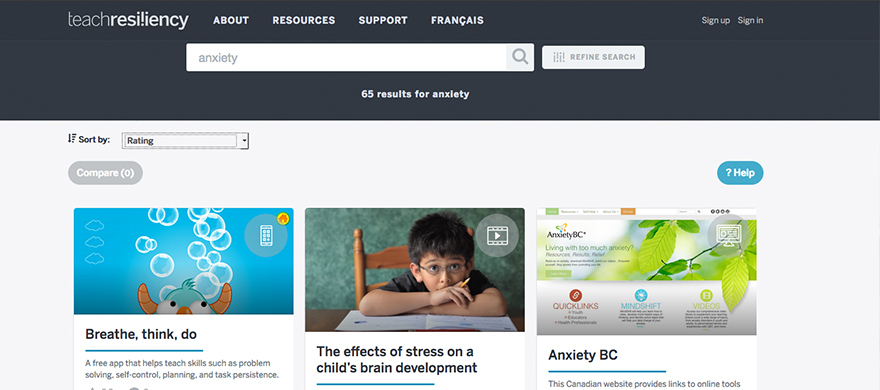
Professor Susan Rodger worked with teachers from the community and a team from Western’s Centre for School Mental Health to develop Teach Resiliency – an online mental health resource for teachers.

Professor Susan Rodger worked with teachers from the community and a team from Western’s Centre for School Mental Health to develop Teach Resiliency – an online mental health resource for teachers.
In an emergency on a plane, if the oxygen masks come down, you’re instructed to put your own mask on before trying to help someone else. The idea is that you must first take the necessary steps to ensure your own wellbeing before you can be of any use to others.
The same applies to mental health in the classroom. Teachers must safeguard and care for their own mental well-being before they can adequately address the needs of their students.
As such, Susan Rodger, psychologist and professor at Western University’s Faculty of Education, led the development of teachresiliency.ca – a unique website filled with research-informed, online resources for teachers that she hopes will soon become the Google of school mental health.
The site launched this week.

The Teach Resiliency website is easily accessible, and filled with research-informed materials vetted by researchers and teachers themselves.
Rodger, a former school psychologist, was noticing a trend. Teachers were seeking out information on mental health from a variety of unexpected, and unreliable, sources.
“Many of them seemed to be going to Pinterest, of all places, to get information,” she said. “But I could see why. It’s fast, accessible, and they were also looking for activities to do in the classroom at the same time.”
Rodger conceived of a mental health resource that would be online, easily accessible, and filled with research-informed materials vetted by researchers and teachers themselves.
She started the teachresiliency.ca project in 2015 with a team from Western’s Centre for School Mental Health, and funding support from Physical and Health Education Canada (PHE Canada), The Co-operators and the Centre for Addiction and Mental Health.
The first step was to bring in teachers from the community to help inform the site and its content.
“It was a beautiful pairing of the university with the front-line individuals who needed and would be using the information,” said Rodger. “We focused as much on accessibility as content, since we needed a way to get evidence-informed information to busy, overworked teachers as quickly as possible.”
Rodger also consulted administrators, mental health professionals, researchers and students in the development and curation of content. Fellow Education professors Alan Leschied and Kathy Hibbert worked on the project as well.
The result is a site filled with carefully vetted multimedia resources like tip sheets, activities, podcasts and videos, as well as original research and content. Everything is aimed specifically at helping teachers care for their mental health, and that of their students.
Rodger and her team conducted a GRADE analysis – Grading of Recommendations, Assessment, Development and Evaluations – to find only the best materials.
“Maybe 30 programs exist to help with anxiety, for example. We found the best evidence for all of them – did it make a difference? Could it be done in a classroom? What did it cost? Can teachers do it or does it need a psychiatrist? We went through it all and recommended only the best.”
Users can search topics and continually refine results. They can filter results by format, relevance, date and even by rating - a metric obtained by users up-voting and down-voting the various resources, which then rise or fall over time.

Search results can be filtered in a variety of ways, including by ranking, a metric obtained by users up-voting and down-voting the various resources.
Rodger also ensured whatever materials resulted form the search could be consumed quickly.
“Teachers may have only five minutes in the morning to learn about something they’ll have to deal with that day, like aggressive behavior,” she said. “There’s no time for research summaries or 160-page journal articles.”
Joe Sheik, Principal at University Heights Public School in London says the resource will prove invaluable to him and his staff.
“Mental health is a topic the teaching community continues to be more and more interested in,” he said. “To have something Canadian-based, easy to use, research driven and funded, and all in one place is fantastic. Who wouldn’t want this?”
While the majority of the site is open to the public, teachers also stressed during the design phase that they wanted the ability to share their challenges and successes with each other in a more private manner. As such, there is a protected area of the site just for teachers, which users can only access by providing evidence of their teaching credentials.
The site has been created to be applicable to teachers across the entire country, from those in remote regions of the Yukon to those in downtown Toronto, and Rodger and her team are now seeking funding to develop an entirely francophone version.
Rodger hopes the site will be a great resource that makes a difference not only in the short term, but the long-term as well.
“We know teaching is a highly stressful occupation, and many individuals leave the profession because of that stress,” she said. “There is a great deal of research showing that when teachers are unwell, outcomes for students are compromised, so by helping to improve teacher mental health now, we hope to see an inevitable improvement in the country’s students down the road.”